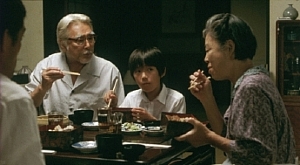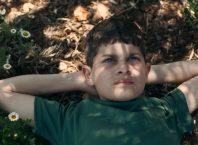The 26th annual Jerusalem Film Festival came to a close yesterday. Although it was working on a smaller budget than in previous years, I found it to be an extremely enjoyable 10 days. The selection of movies was somewhat lower-profile compared to previous years, but there was still an ample away of films of different budgets, nationalities and styles for one to enjoy, many films of varying quality. Interestingly, each of the last five films I saw falls squarely into a different category, quality-wise. One was somewhat painful, one solidly entertaining, one odd, one great old film, and one great new one. That’s as good as order as any to take them, so here it goes:
I went to see Five Minutes of Heaven for its two stars, Liam Neeson and James Nesbit. Neeson is one of my favorite actors and I recently caught up with Paul Greengrass’ Sunday Bloody Sunday, in which Nesbit is marvelous (in a great film). I was interested, but a bit apprehensive about director Oliver Hirschbiegel’s involvement. Downfall, his 2004 film about Hitler’s last days, is a very problematic film, and I haven’t heard a single good thing about his last film, The Invasion, with Nicole Kidman and Daniel Craig. His newest film is not morally troubling like Downfall; it is simply not a good film in general. It is often boring, has an ill-conceived plot, descends into tedious formulaic depths, and has tonally jarring comic interludes.
A television show has arranged for a filmed meeting between a former Irish terrorist (Neeson) and the brother of a man he murdered in the 70’s (the brother played by Nesbit). For most of the film, we see the two men preparing for the interview, inter-cut with a flashback to the day of the murder. The flashback holds little interest; it is simply showing us what the characters in current day are describing. Seeing the two older men -Nesbit in particular- mentally preparing for the interview is somewhat interesting, but not nearly enough to warrant a film of it. Neeson’s character just sits waiting for Nesbit, spouting self-serving wisdoms about the errors of his past ways (He has written a best selling book on the subject). Nesbit tries his best to build some anxiety, but that is punctured by hearing him think to himself, generally in a comic tone. For a film that is attempting seriousness, I am baffled by these totally inappropriate moments of levity. Maybe they were just trying to get the running time up to the current 90 minutes (at least 80 minutes too long). Once the interview is about to begin, the film devolves into an utterly uninteresting and uninvolving vague series of scenes, which somehow is supposed to convince us that violence is not the answer.
I do not know why this film was made, and I found its triviality disturbing, given the serious conflict it uses as a backdrop.
A much more pleasant experience was to be had with John Woo’s Red Cliff. An epic tale of a conflict in the Chinese empire which fits in the genre of the western friendly Eastern epics from the likes of Zhang Yimou (Hero, House of Flying Daggers, Curse of the Golden Flower, and of course the opening ceremony of the 2008 Beijing Olympics) and Chen Kaige (The Promise). It’s friggin’ huge- there’s an absurd amount of everything here. Horses, men, ships, fires, arrows…it seems like it’s trying to out-macho everyone. But it’s really fun. The stiff dialogue is a bit hard to swallow, but once one accepts that it’s part of the genre, I think someone can have a good time sinking into this 140-odd minute extravaganza. Woo does not quite have the poetic feel of Yimou’s epic, but that’s to be expected, seeing as they come from such radically different genres of filmmaking (Raise the Red Lantern and Qui Ju vs. Hard Boiled and Face/Off). There’s not a dull minute to be found here. The cutting is very fast (aside from the expensive money shots of the vast computer generated armies), and there’s a whole bunch of slow-motion (the jerky, cheesy looking kind, added in post-production, as opposed to the planned kind). One gets the sense that every single cent spent of the film appears on screen, and then some (this film would probably be cost-prohibitive without the kind of cooperation I assume Woo received from the government). There is some none-too-subtle commentary, which basically says that peace is a coward’s route, and that a real general fights the enemy alone while his soldiers stand in formation- but that’s hardly what sticks in one’s mind. It’s the unbelievably massive battle scenes, particularly an early one, involving a tortoise formation, which requires extreme stupidity on the side of the attackers, yet looks ridiculously awesome on screen (of course, the last third of the film is one massive battle). It looks nice, is appropriately acted (the main star is the great Tony Leung, who’s lines often seem to have been badly dubbed, for some inexplicable reason), and has a nice, melodic, epic-ish score. I had a blast with the film (apparently, Woo also shot an equally long sequel to the film…as much fun as I had, 5 hours of this sounds quite exhausting to me).
As for the oddity…it sounds like a gimmick- a movie who’s director is 100 years old (His first credit as director is from 1931). The oldest living active filmmaker, Portuguese director Manuel De Oliveira is intent on releasing one film every year until he passes on. That’s not what’s odd about this film. It is called The Eccentricities of a Blond-Haired Girl, and is about a young man who, on a long train journey, is recounting his tale to a fellow passenger. While working as an accountant for his uncle’s clothing shop, he became enamored with a beautiful blond-haired girl in a window across the way. He meets her, courts her, and tries to make money so that he can marry and support her. This is where the oddness comes into it. After he seems to have won her, this charming love story turns into a joke. I felt like I was being served a punch-line at the end of the film, with a twist so unexpected that I had to laugh out loud. It sounds like a vulgar reaction to an otherwise quiet and precise film. I’m not aware of enough of de Oliveira’s work to put into context of his sensibilities. But just thinking about the ending of this film, I just keep coming back to the fact that this resolved itself as a wicked little joke. A blonde joke, in fact.
Last and best, we get to the two great films. The first is a long established classic, Max Ophuls’ 1955 swan-song, the glorious Lola Montès. It is so established, in fact, that one viewing is not nearly enough for me to do it justice. This is the story of the eternal Lola (explored on film also by G.W. Pabst in Pandora’s Box and Jacques Demy in Lola), who’s tumultuous love affairs are the center of a circus act in which she stars. Martine Carol is somewhat bland Lola, but as a woman who drives men insane, most of her appeal is branded upon her by the men around her, most memorably Peter Ustinov as the circus ring-master and Anton Walbrook (The humane, kind-faced actor from The Life and Death of Colonel Blimp) as King Ludwig of Bavaria. The film is a ravishingly beautiful color film, and is worth seeing just for that experience, even if one has trouble with the somewhat old-fashioned plot. I must admit, I noticed myself losing myself in the stunning visual and aural world of the film, having to catch up with the themes of the piece. I look forward to (hopefully) one day connecting the theme of the film with its form more fully.
Happily, the last film I saw during the festival was one of the best- Japanese director Hirokazu Kore-eda’s Still Walking. The film shows approximately 24 hours of the relationships within one middle class Japanese family. It may not sound thrilling, and it does take a few minutes to get accustomed to its deliberate pace, but no new film I saw at the festival resounded as strongly with me as this one did. Its mundane framework supported a portrait of a family that must be universal, as every single major character in it reminded me of someone in my own family. The family does get together to mark something specific- the anniversary of the untimely death of the eldest brother, but that’s just the impetus to get them together in the film. Everything here played out in a way that I recognize from my own life. That power of observation on the part of Kore-eda sounds simple enough –most of us have families- but is rarely presented with such simplicity and humanity. There are practically no theatrics on display here; it is just as contained as a family getting together. The laughter, tears, arguments and reconciliations all rang true to me, though the film is not all fuzzy nostalgia. It can be quite sharp when it wants to, and does that, particularly towards the end- there’s no tidy ending to be found here (except for death, perhaps). Just truth; and a generous amount of sympathy.
p.s. The film appears to have been inspired by the sensibility of the great Japanese director Yasujiru Ozu, and particularly by his film Tokyo Story. That story is about an elderly couple who come to visit their children in the big city, only to find that their children have no time for them. Like Hsiau-Hsien Hou’s recent film The Flight of the Red Balloon, Kore-eda takes the older classic as a reference point -both thematic and visual- and spins his own personal take on the concept.
SHLOMO PORATH






